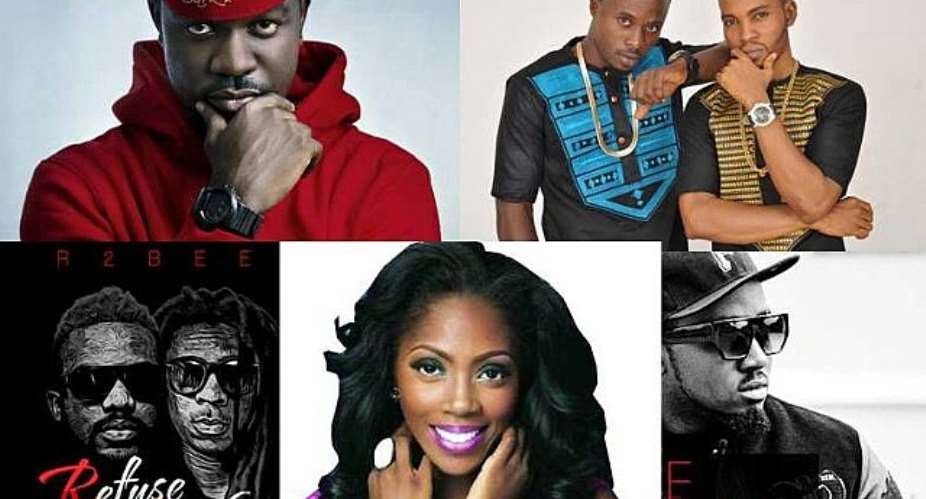Over the years, I have decided to broaden my tentacles and research into why some particular countries in Africa has its artistes playing shows in other African countries more than others.
It is quite obvious that Nigeria, South Africa and Ghana have been rated as countries that are musically activate. Benin's Angelique Kidjoe,and South Africa's Hugh Masekela,HHP, are just few names that immediately comes into mind talking about stars who have played shows across the continent.
Nigeria has a tall list of artistes who have been booked by head of states and cooperate bodies over the years to play big concerts. Ranging from Fela Kuti,Asa and in recent times D-Banj P-square,Tuface,Inyanya,Wizkid,Davido,Banky W,Tiwa Savage,Timaya,Ice Prince and new names every year. Burna boy,Selebobo and Kcee are few of the latest additions.
However in Ghana,the story is totally different as compared to the days of Amandzeba,Nat Brew Koo,Osibisa when they also enjoyed some diplomacy, playing gigs for head of states in neighboring countries. In Ghana we can only point out Fuse ODG courtesy his “Antenna” hit song, R2bees, Sarkodie, Samini, Wanlov and Mensa, who at times gets invited. It is worth noting that these are the same old names we have heard over the years.
The Ghanaian dancehall fraternity is gradually cutting an edge for themselves.
The big question here is; what exactly are the South African and Nigeria artistes doing that Ghanaians cannot or are not doing to help them penetrate through Africa?
Secondly, what is forcing Ghanaian music players like radio presenters and Djs to be playing more Nigerian & South African songs than the songs produced by Ghanaians?. The system is different in Nigeria and other countries. Ghanaian music does not enjoy massive airplay in those countries like theirs do in Ghana. I don't necessarily believe that the size of your countries economy matters in this perspective. Good music paves ways to its lovers.
I believe Ghana has versatile song writers and sound engineers that can push out a better production which can equally sell across the continent like how Kukere and Davido's 'Dami Duro' took African's by surprise.
If language was truly a barrier, then Cabo Snoops 'Windeck' and Mafikizolo's 'Kona' will not be the number one African song for virtually six month to the extent of winning an Award at the 2013 4syte Music Video Awards in Ghana and other Awards respectively?
The only way Ghanaians can commercially breakthrough the music industry in Africa is to research properly, write lyrics, invest, ready to learn how to play live shows and produce songs that are more African than Ghanaian. Most musicians are scared of branding themselves and that is the comparative advantage others have over them. So why not think of professional branding?
That is also not to say they should deviate from the indigenous style. There is a borderline; Afrobeat (African beat) has evolved and has presented itself in a dynamic way and artistes who are digging into it archives are touching the heart of their fans. Least of songs that can be considered as Afrobeat includes Kcee ft Wizkid's Pull Over,Sarkodie ft mugeez “Give it to me,Inyanya's Kukure,Wizkid ft Fela ” Jaiye, Samini ft Mugeez “Sweet Mistake ,SK Original “Famame, Fuse ODG's Antenna,R2bees “Kiss your hands and Someone like you and the latest production by Ghanaian group Gallaxy called BokoBoko.
Technically these songs have the feel of the authentic African drums in the instrumentation live and arrangement by the respective sound engineers. Moreover the languages cut Francophone and Anglophone jurisdiction which is a dominant element of an Afrobeat. This is the trend which will not fade away.
Some known Africans have been tolling this direction over decades now and are still selling commercially across the continent. Rhythms does not die, they evolve and present themselves in different way to suit the new world,That is what the new generation is calling “contemporary”which is quite debatable. Locally we can all testify to the evolution of Ghanaian highlife music.
EL, D-Black,Sarkodie,R2bees,Castro who came into the industry as Hip-life artistes are producing high life now because that is what is more commercial now. So it about time they expand their capacity to reach the African Audiences who are waiting to hear them.
If reaching the global community is the focus of the business minded Ghanaian musician,then we should restructure our production and marketing policies.





 Lay KPMG audit report on SML-GRA contract before Parliament – Isaac Adongo tells...
Lay KPMG audit report on SML-GRA contract before Parliament – Isaac Adongo tells...
 Supervisor remanded for stabbing businessman with broken bottle and screwdriver
Supervisor remanded for stabbing businessman with broken bottle and screwdriver
 NDC watching EC and NPP closely on Returning Officer recruitment — Omane Boamah
NDC watching EC and NPP closely on Returning Officer recruitment — Omane Boamah
 Your decision to contest for president again is pathetic – Annoh-Dompreh blasts ...
Your decision to contest for president again is pathetic – Annoh-Dompreh blasts ...
 Election 2024: Security agencies ready to keep peace and secure the country — IG...
Election 2024: Security agencies ready to keep peace and secure the country — IG...
 People no longer place value in public basic schools; new uniforms, painting wil...
People no longer place value in public basic schools; new uniforms, painting wil...
 'Comedian' Paul Adom Otchere needs help – Sulemana Braimah
'Comedian' Paul Adom Otchere needs help – Sulemana Braimah
 Ejisu by-election: Only 33% of voters can be swayed by inducement — Global InfoA...
Ejisu by-election: Only 33% of voters can be swayed by inducement — Global InfoA...
 Minority will expose the beneficial owners of SML, recover funds paid to company...
Minority will expose the beneficial owners of SML, recover funds paid to company...
 Prof. Opoku-Agyemang has ‘decapitated’ the NPP’s strategies; don’t take them ser...
Prof. Opoku-Agyemang has ‘decapitated’ the NPP’s strategies; don’t take them ser...
